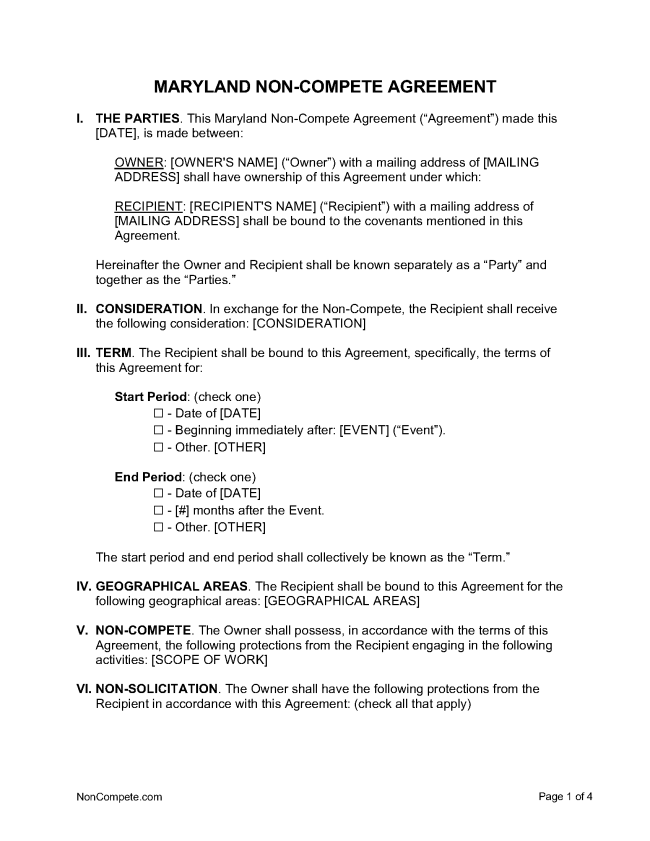A Maryland non-compete agreement is a contractual limitation on the ability of an employee, or owner of a business, to carry out some kind of work in the future. Like many states, Maryland relies on a loose standard of “reasonableness” to determine whether a non-compete agreement is enforceable. However, the state has distinct rules about subjects like modifying agreements and what sort of consideration is needed for an agreement to be enforced.
Table of Contents |
Are Non-Competes Enforceable in Maryland?
Yes, so long as they are
- Part of a valid contract
- Supported by adequate consideration
- Last no longer and cover no broader an area than is reasonably necessary to protect a business, and
- Do not impose an undue hardship on the employee or disregard the public interest.
Reasonableness
Along with the above, these are the factors that are used to determine whether or not a non-compete agreement is considered reasonable and thus enforceable:
- Whether the worker is skilled or unskilled, or provides a unique service (agreements involving more skilled workers and rarer services are more likely to be considered reasonable); and
- Whether personal contacts the employee acquired while working for the employer would help lure those customers away.
Budget Rent A Car of Washington, Inc. v. Raab (1973).
Protectable Interest
The following are considered interests that may be legitimately protected by a non-compete agreement:
- Trade secrets
- Sales routes and lists of contacts
- Customer relationships
- The good will of a business.
Ecology Services, Inc. v. Clym Environmental Services, LLC (2008)
Sale of Business vs. Employment Contract
Because of the need to protect good will when buying a business, non-compete agreements connected with the sale of a business face a more lenient standard: They need only show that the non-compete agreement is no broader than what is required to protect that good will. (Checket-Columbia Co. v. Lipman (1953))
Because of this lower standard, it’s possible that non-compete agreements found in contracts for the sale of a business may last longer than those in employment contracts. See the “Maximum Term” section.
Public Interest
Courts are more likely to find that a non-compete agreement does not harm the public interest if it is being used in a competitive industry, and if enforcing the agreement is unlikely to produce a monopoly. (Ruhl v. F. A. Bartlett Tree Expert Co. (1967)).
Prohibited Workers
Non-compete agreements found in employment contracts or partnership contracts that involve attorneys are generally unenforceable, except for agreements regarding retirement benefits. Rule 19-305.6(a), Maryland Court Rules.
A court case cannot be settled in a way that restricts an attorney’s ability to practice in the future. Rule 19-305.6(b), Maryland Court Rules.
Non-compete agreements cannot be enforced against workers making less than $15 an hour or $31,200 per year, except for agreements regarding client lists or proprietary client-related information. Md. Code Ann., Lab. & Empl. § 3-716.
Terminating an Employee
A non-compete agreement may be unenforceable against an employee who has been terminated if the effect of the termination is that the agreement creates an undue hardship for an employee. (MacIntosh v. Brunswick Corp. (1965)).
Burden of Proof
The party seeking to enforce a non-compete agreement has the burden of producing evidence that a court should act to prevent the other party from violating it. (Nationwide Mut. Ins. Co. v. Hart (1988)).
Continued Employment (consideration)
Continued employment for a “substantial period” after signing an agreement is adequate consideration In Simko, Inc. v. Graymar Co. (1983), the Maryland Court of Appeals held that nine years of employment after signing was adequate, but also ruled there is no exact definition of “substantial period” and that it will depend on the circumstances of each case.
Maximum Term
Regardless of how long the agreement lasts, it must have a defined beginning and end, and cannot be scheduled to start based on some contingent event. (Nationwide Mut. Ins. Co. v. Hart (1988)).
There is no clearly defined maximum term for a non-compete agreement in Maryland. Instead, it will depend on the circumstances of each case.
- In an employment contract with the manager of a tree service company, a non-compete agreement covering a six-county area was enforceable for two years. (Ruhl v. F. A. Bartlett Tree Expert Co. (1967)).
- In the sale of a retail store, a non-compete covering 10 blocks of a city was enforceable for 10 years, or as long as the buyer was in business, whichever came first. Checket-Columbia Co. v. Lipman (1953)
Blue Penciling
Non-compete agreements should not be extended beyond the meaning of whatever is expressed in the original contract. (Checket-Columbia Co. v. Lipman (1953))
Courts can excise or cross out parts of non-compete agreements that are excessive, but probably cannot rewrite or add new terms to make a non-compete enforceable. (Fowler v. Printers II, Inc. (1991))
